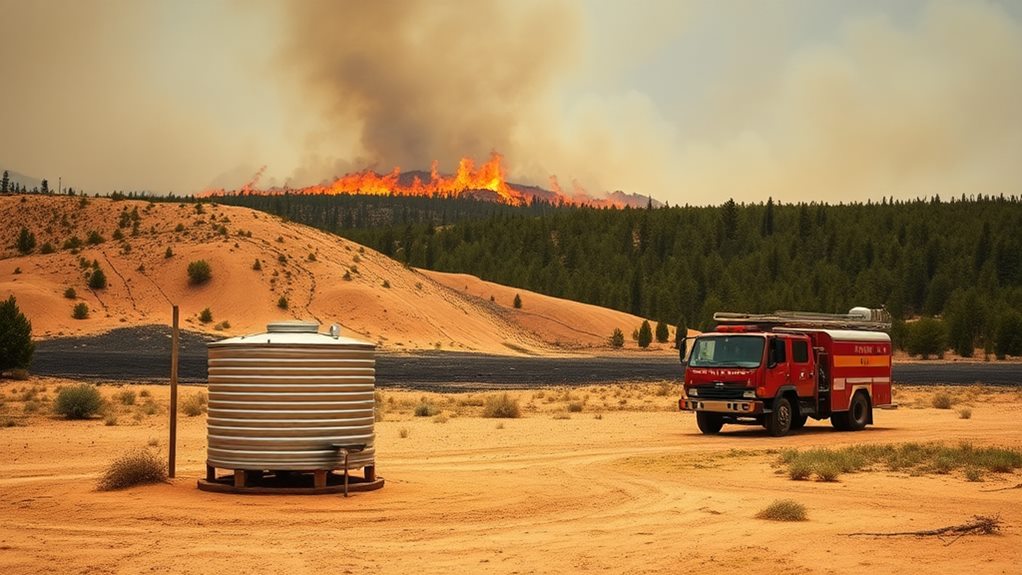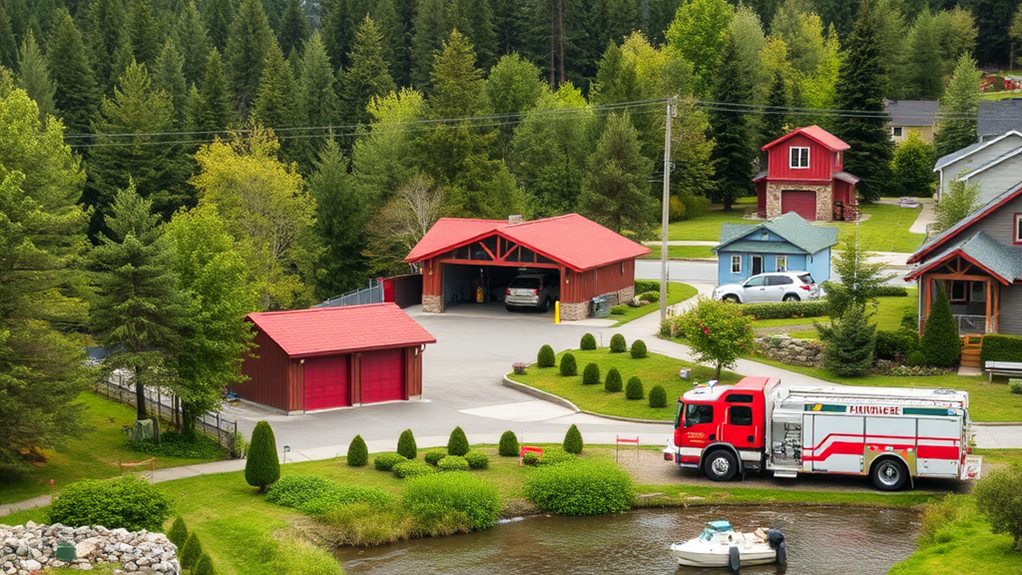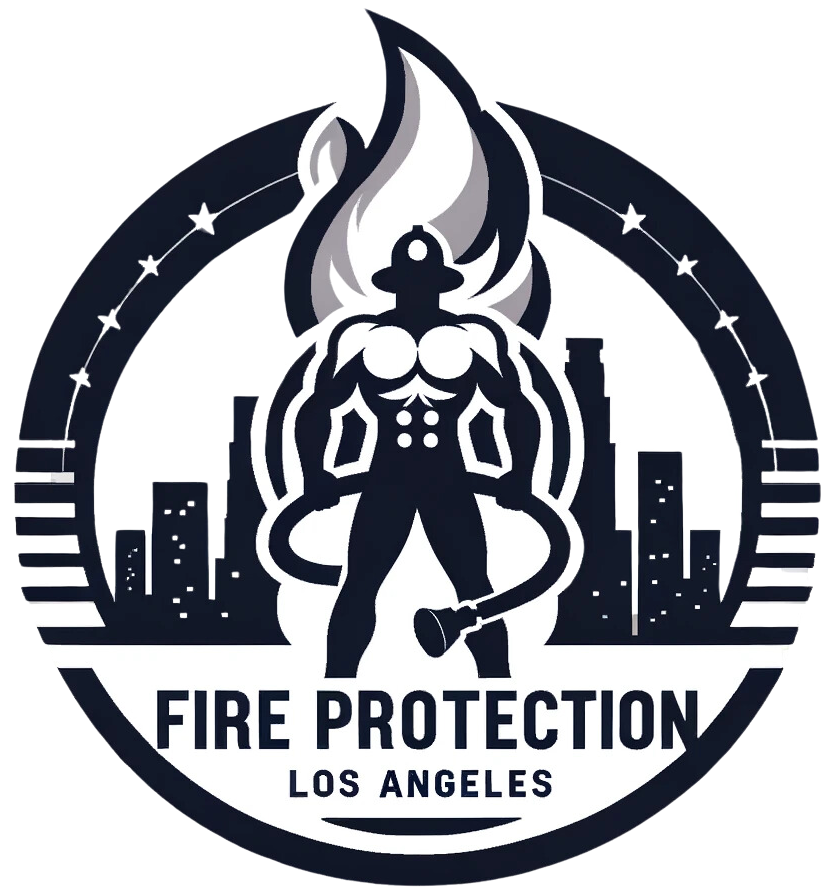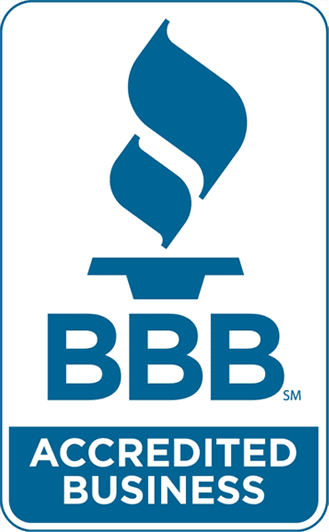We should consider private firefighting solutions when public resources fall short, especially in areas with limited funding or higher fire risks. If we own high-value property or face specific hazards, private services offer specialized training and rapid response times tailored to our needs. Community contracts with private organizations can fill gaps, ensuring enhanced safety and quick access to emergency resources. Additionally, these services can be more cost-effective compared to traditional departments. By enhancing collaboration with public fire services, we can improve overall emergency response during critical situations, providing us with the safety we need and deserve in our communities.
Resource Limitations in Public Firefighting

In our communities, the reliance on public firefighting services often reveals significant resource limitations that can jeopardize safety. Public fire departments, funded mainly by our community taxes, often struggle with insufficient resources, especially in lower-income areas. Here, funding is limited, which can lead to delays in emergency response during large-scale incidents like wildfires.
As urban expansion into wildland areas continues, the risk of fire-related incidents increases, exacerbating these challenges. When these emergencies strike, our public fire departments may become overwhelmed, resulting in longer wait times for help.
We can't ignore the disparities between wealthier and poorer communities. Wealthier neighborhoods typically enjoy better-funded fire departments, while lower-income areas face challenges due to inadequate funding. These budget constraints can hinder the ability of public fire departments to invest in advanced training, tools, and technologies essential for effective firefighting.
Additionally, the growing reliance on private services for enhanced safety measures is becoming increasingly apparent, as many seek to address these urgent needs the increasing prominence of private services.
As we recognize these challenges, some communities are considering private fire protection services to fill the gaps left by public departments. By exploring these alternatives, we can enhance our overall safety and guarantee that everyone in our community receives the emergency response they deserve.
Addressing these resource limitations is vital for protecting our homes and loved ones.
Specialized Training Needs
When it comes to specialized training needs, we recognize that private firefighting services offer unique programs tailored to specific industries.
These training sessions not only focus on compliance and safety standards but also equip personnel with the skills necessary to handle hazardous materials and emergencies effectively.
Industry-Specific Training Programs
Private firefighting companies play an essential role in addressing the unique challenges posed by various industrial environments through tailored training programs. They provide specialized training that meets OSHA regulations, ensuring their personnel are well-prepared for any situation.
By focusing on specific hazards present in different industries, private fire departments can create effective emergency response teams. This is particularly important given the higher fire risks associated with flammable chemicals and complex machinery in industrial settings, highlighting the need for continuous evaluations of fire safety measures.
For instance, companies like Capstone Fire & Safety Management offer rigorous training that often includes attendance at specialized fire schools, such as Texas A&M. These programs help firefighters gain the skills needed for complex emergencies, including industrial fires, chemical spills, and hazardous material incidents.
Private fire brigades typically recruit experienced professionals from the industrial sector, bringing valuable knowledge to the team. This experience helps them develop unique training regimens based on years of managing major incidents.
Continuous education in areas like emergency medicine and confined space operations is vital to their training, making sure they're ready for diverse emergency scenarios.
Compliance and Safety Standards
As we focus on compliance and safety standards, it's clear that private fire protection companies must meet rigorous OSHA regulations to secure safety across various operational environments. This commitment guarantees that they provide effective safety services, regardless of the state in which they operate.
Private fire services, classified under NAICS 561990, must adhere to specific regulations covering fire protection and emergency response. By obtaining certifications for fire safety professionals, private companies can further demonstrate their commitment to maintaining high standards of safety and compliance.
Specialized training is essential, particularly in hazardous situations where public sector fire departments may lack funding. By investing in extensive training programs, private fire protection companies can address gaps in emergency response services.
Regulatory inspections play a significant role, as they verify compliance with standards outlined in 29 CFR 1910, 29 CFR 1904, and sometimes 29 CFR 1926. These inspections help maintain operational effectiveness and confirm that safety measures are in place.
Ultimately, continuous training programs are critical for private fire protection teams. They guarantee readiness for specialized emergencies, providing a significant advantage over underfunded public fire departments.
High-Value Property Protection

When it comes to protecting high-value properties, specialized fire services play an essential role in ensuring safety.
These services often partner with insurance companies, providing homeowners with benefits like priority response and tailored protection plans that go beyond what municipal services can offer.
By implementing advanced fire suppression techniques, we can greatly enhance fire safety and reduce risks for our most valuable assets.
Utilizing advanced techniques and equipment, we can greatly enhance fire safety and reduce risks for our most valuable assets.
Specialized Fire Services
High-value properties require specialized fire services to guarantee their protection from potential threats. These services are tailored specifically to meet the unique needs of luxury homes and commercial buildings. By partnering with private firefighting services, property owners can secure rapid response times and effective fire protection.
For instance, organizations like Capstone Fire & Safety Management provide OSHA-compliant fire brigades, bringing expertise in managing hazardous materials and the unique risks associated with industrial properties.
Meanwhile, Rural Metro Fire offers customizable fire protection on a subscription basis, especially beneficial for affluent communities lacking municipal coverage.
Moreover, private fire services often utilize advanced firefighting equipment, like large-volume portable water pumps and specialized foam concentrates designed for different fire types. This technology enhances their effectiveness in protecting high-value properties from fire damage.
Importantly, the collaboration between public and private fire sectors can greatly improve emergency response times and resource allocation, especially in critical situations like wildfires threatening wealthy neighborhoods.
Insurance Partnerships Benefits
In today's landscape of high-value property protection, partnering with private firefighting organizations offers significant advantages, especially through collaborations with insurance companies.
When we choose private firefighting services, we gain access to specialized resources tailored to our unique risks. This collaboration enhances safety and provides quick response times that truly make a difference in emergencies.
Here are some emotional benefits of these partnerships:
- Peace of mind knowing our homes are protected by experts
- Reduced risk of devastating losses during a fire
- Customized fire prevention strategies that fit our specific needs
- Potential premium discounts from insurance companies
- Faster recovery from incidents, minimizing disruption to our lives
Large-Scale Emergency Responses
Large-scale emergency responses, like wildfires, demand swift action and robust resources to effectively manage the chaos that ensues. Public fire departments often find themselves overwhelmed during these events, leading many communities to turn to private firefighting solutions for supplemental support.
These private services provide immediate access to trained professionals and specialized equipment, enhancing response capabilities when municipal resources may be insufficient or delayed.
Collaborating with private firefighting organizations has proven beneficial in large-scale emergencies. For instance, during the California wildfires, joint efforts between public and private agencies improved resource allocation and greatly reduced response times.
When every second counts, having additional support can make a real difference.
Moreover, private firefighting services often offer specialized training that equips their teams to handle hazardous materials and complex situations. This expertise can fill critical gaps in local response capabilities, ensuring that communities receive the timely and effective fire protection they need.
Community Contracting Opportunities

Community resilience thrives when tailored fire protection services are accessible. One way to achieve this is through community contracts with private fire services. These agreements allow us to address specific needs in our neighborhoods, enhancing our emergency response capabilities.
By collaborating with private organizations, we can fill gaps left by municipal services, particularly in areas lacking adequate fire protection.
Consider the benefits of community contracts:
- Customized fire prevention strategies that fit our unique environment
- Access to specialized fire suppression and inspection services
- Enhanced safety for homes and businesses in high-risk areas
- Flexible funding options through service billing or subscription models
- Improved collaboration with local governments for a stronger emergency response
These opportunities guarantee that our communities can effectively manage fire risks, especially in regions prone to wildfires or industrial hazards.
By investing in private fire services, we not only safeguard our properties but also foster a sense of security and preparedness among residents.
Let's take the initiative to explore these contracts, as they can play a vital role in guaranteeing our community's safety and resilience against fire threats.
Benefits of Private Fire Services
Exploring community contracts with private fire services reveals a host of benefits that can greatly enhance our fire protection efforts. For communities lacking municipal fire departments, these private services fill critical gaps, guaranteeing essential fire protection through tailored subscription-based models. This flexibility allows us to choose services that meet our unique needs.
One major advantage of private fire services is their specialized training. Personnel are often equipped to handle unique hazards, like hazardous materials and industrial emergencies, which might be beyond the capabilities of local fire departments.
With typically higher budgets funded by contracts and subscriptions, private fire services can invest in better equipment and training opportunities.
Moreover, collaboration between private and public fire services can greatly improve response effectiveness during large-scale emergencies, like wildfires. By working together, they can share resources and strategies to protect our communities more efficiently.
Additionally, private firefighting solutions offer customized fire prevention services, taking proactive measures to safeguard homes and businesses.
This thorough approach to fire protection guarantees that we've the necessary support to keep our communities safe and resilient against fire threats.
Cost Considerations for Fire Solutions

When evaluating fire protection solutions, it's essential to weigh the costs and benefits of private firefighting services. For commercial property owners and homeowners, understanding cost factors can help us make informed decisions.
Private firefighting services often operate on a subscription-based model, typically costing between $300 to $1,500 annually, depending on coverage levels and property size.
Here are some emotional factors to reflect on when evaluating these services:
- Peace of mind knowing help is nearby
- Faster response times during emergencies
- Tailored services that meet our specific needs
- Potential savings compared to tax-funded municipal fire departments
- Enhanced training and equipment for better protection
Funding for private firefighting primarily comes from service billing and contracts with insurance companies, which can lead to lower costs for clients.
In areas lacking a municipal fire department, the costs associated with private firefighting solutions are often justified by the increased level of service we receive.
As we explore our options, we should remember that private firefighting services can provide specialized support that addresses our unique situations, ensuring our properties and communities are well protected.
Final Thoughts
In summary, considering private firefighting solutions can be essential for protecting valuable assets and ensuring safety in our communities. Just like a well-trained athlete prepares for a big game, private fire services offer specialized skills that can make a difference during emergencies. By evaluating our needs and resources, we can determine if these solutions are right for us, ultimately enhancing our fire protection strategy and ensuring a safer environment for everyone.








